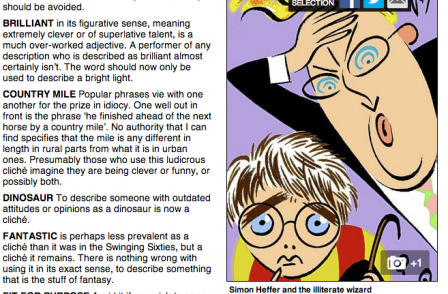
As associate editor of the Daily Telegraph Simon Heffer was guardian of the paper’s style and given to lambasting via email colleagues when standards were felt to be slipping.
Heffer, who has been at the Daily Mail since 2011, has now gathered together a career’s worth of his grammatical and usage pet hates into the book Simply English, which is published this week by Random House.
It reads like a newspaper style guide and promises to be one of the best additions to the genre since Keith Waterhouse’s classic: On Newspaper Style.
While Heffer's book is aimed at the general reader, I suspect he had sloppy hacks in mind when he was writing it.
Read Heffer's book serialised in the Daily Mail here, here and here. His entry on use of the word legendary has already been added to the Press Gazette style guide (I can only apologise for past offences).
These are ten of my favourite lessons from the Heffer school of English:
AGONY and its derivatives such as agonising should be used only in a context that suggests extreme physical or mental suffering. It is hackneyed to talk about ‘the agony of Spurs losing to Manchester United’ or ‘the agonising decision about which chocolate to eat’. It is correct to say that ‘the death of his children caused him agonising grief ’.
BATED and BAITED That prime work of modern literature, Harry Potter And The Prisoner Of Azkaban, includes the phrase ‘the whole common room listened with baited breath’. A mousetrap or a fish-hook may be baited; but one’s breath is bated — a contraction of abated — or shortened.
COMPLEMENT and COMPLIMENT A complement is a number of people or objects, or something that adds to them. A compliment is what one pays to, for example, an attractive woman or a handsome man; therefore, a charming remark is complimentary. Something that augments something else is complementary, as in a complementary saucer with a cup.
DISCREET and DISCRETE mean two completely different things. Until 20 or 30 years ago, discrete was used only in learned journals. The word means ‘separate’ — ie a discrete service is one distinct or separate from something else. Discreet, on the other hand, means tactful, understated, restrained, lacking in vulgarity. Therefore a discreet service is service carried out without show or ostentation.
ENQUIRY and INQUIRY An inquiry is a formal investigation, usually conducted by a judge or senior official. An individual asking the time of a train enquires, or makes an enquiry.
FIT FOR PURPOSE Avoid it if you wish to say or write something original and penetrating.
FRACTION Educated writers often use the phrase ‘a fraction of the cost went towards overheads’ without thinking of its logic. What they inevitably mean is ‘a small fraction’ — because they forget that nine-tenths is also a fraction.
FULSOME We have all read about someone making a fulsome apology. Those who use this phrase usually believe that the adjective means ‘full’ or ‘plentiful’, but it doesn’t. What it does mean is something that is overdone or grotesquely flattering or obsequious, and therefore insincere.
HERO If a man who scores a goal is a hero, what term do we reserve to describe one who wins the Victoria Cross? Choose descriptive nouns with care.
LEGENDARY has become a grotesquely overused adjective that is applied to people who have had moderate success or fame at soccer, acting or as popular entertainers — as in ‘the legendary Roy Orbison’. Since the early 17th century, however, legendary has been used to describe a tale of antiquity, handed down often through the narrative tradition, for which the historical evidence is either scant or non-existent. The late Mr Orbison is of recent provenance, and that he existed is beyond question. It is therefore best to confine the term legendary to people who are genuinely the stuff of legend over many generations, such as St George, Robin Hood or King Arthur.
Email pged@pressgazette.co.uk to point out mistakes, provide story tips or send in a letter for publication on our "Letters Page" blog







